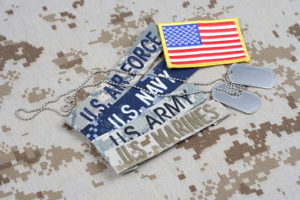Helping Formerly Incarcerated Veterans with the Veterans’ Treatment Court
By Danielle A. – Criminal Justice Intern
 Being a veteran is something to be very proud of in America. To know you served your country with dignity and respect is a great honor. One’s family and friends take pride in saying they know a veteran. But what happens when it’s time to return to civilian life? Everything isn’t as easy as it may seem. Many veterans come back home suffering from post-traumatic stress disorder, numerous mental diseases, traumatic brain injuries, and other physical injuries as a result of their deployment. While dealing with these post war traumas, veterans have found themselves entering the criminal justice system due to domestic violence, substance abuse, and other criminal activities.
Being a veteran is something to be very proud of in America. To know you served your country with dignity and respect is a great honor. One’s family and friends take pride in saying they know a veteran. But what happens when it’s time to return to civilian life? Everything isn’t as easy as it may seem. Many veterans come back home suffering from post-traumatic stress disorder, numerous mental diseases, traumatic brain injuries, and other physical injuries as a result of their deployment. While dealing with these post war traumas, veterans have found themselves entering the criminal justice system due to domestic violence, substance abuse, and other criminal activities.
This is an issue many don’t think about. Sadly, 8% of all individuals incarcerated in jail or prison are veterans and out of that 8%, 60% have mental health and substance abuse issues. While they may have had previous issues before even entering the military, their deployment only made it worse. Many veterans also deal with homelessness, unemployment, and limited resources regarding medical treatment. This causes jail and prison to be a revolving door for them.
Incarcerated veterans have become such a major issue in the US that a court was created specifically for the issue. In 2008, Judge Robert Russell created the Nation’s first Veterans Treatment Court (VTC) in Buffalo. This was in response to the growing number of veterans entering the criminal justice system at an alarming rate. VTC has been so successful that to date there are over 400 specialized courts in the US as of 2016. Many veterans have untreated mental health issues from traumatic experiences during their time in the military and the traditional justice system is not exactly what they need. The goal of VTC is to give the veterans the proper treatment and help with rehabilitation. It’s also important to keep the veterans connected with their VA benefits. Veterans Treatment Court is completely optional. Usually VTC hears cases involving misdemeanor charges, with the exception of cases involving sexual offenses or violent crimes.
 Veterans Treatment Court isn’t the only resource for justice involved veterans. The Department of Veterans Affairs and Veterans Justice Outreach were created to provide treatment to participants. They both coordinate with the VTC to provide counseling services, job placement, and housing. The results of the VTC have been remarkable. It’s been noted that veterans who have successfully completed the Veterans Treatment Court are 32% less likely to reoffend within their first year of being released compared to those who opt out of participating in the program altogether.
Veterans Treatment Court isn’t the only resource for justice involved veterans. The Department of Veterans Affairs and Veterans Justice Outreach were created to provide treatment to participants. They both coordinate with the VTC to provide counseling services, job placement, and housing. The results of the VTC have been remarkable. It’s been noted that veterans who have successfully completed the Veterans Treatment Court are 32% less likely to reoffend within their first year of being released compared to those who opt out of participating in the program altogether.
Everyone makes mistakes in life, including some of the strongest. Veterans Treatment Court was created to help the country’s bravest with what may be their toughest battle. This specialized court is able to provide veterans with the specialized help and resources they need. With their great success rate, the program will only continue to grow and help more military personnel.